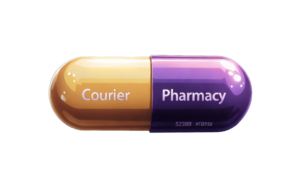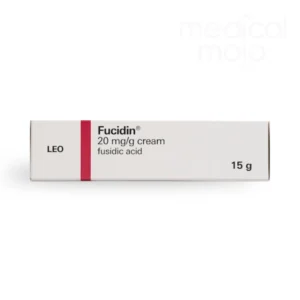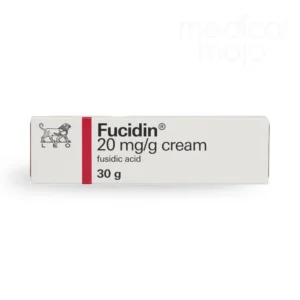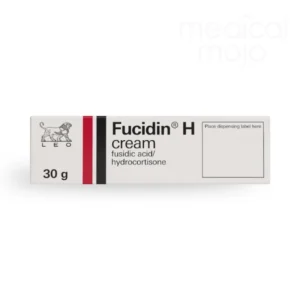Skin infections are a common concern for people of all ages, especially children. Whether it’s a patch of impetigo, an irritated hair follicle, or a cut that’s become red and sore, finding the right treatment is key to fast and effective healing. Fucidin cream has become a trusted solution for many types of bacterial skin infections, thanks to its proven track record and ease of use.
In this guide, we’ll break down everything you need to know about Fucidin cream—how it works, when to use it, and why it’s often the first choice for doctors and pharmacists. If you’re looking for straightforward answers and practical advice on treating skin infections, you’re in the right place.
Our goal is to provide a clear, easy-to-understand resource to help you make informed decisions about your skin health.
Table of contents
- What is Fucidin cream?
- How does Fucidin cream work?
- How to get Fucidin cream?
- What is Fucidin Cream used for?
- Fucidin and impetigo
- How well does Fusidic Acid cream treat impetigo?
- When should Fucidin Cream NOT be used?
- Is Fucidin H stronger than Fucidin Cream?
- Other alternatives: Fucibet Cream
- Fucidin Cream FAQs
- Fucidin cream summary
- References:
What is Fucidin cream?
Fucidin Cream is a prescription-only topical antibiotic that contains fusidic acid [1].
It works by targeting and eliminating bacteria that cause skin infections, helping to reduce inflammation and promote healing.

How does Fucidin cream work?
Fucidin Cream works by blocking bacterial protein production, preventing the bacteria from growing and spreading [2].
When applied directly to the affected area, Fucidin Cream helps to:
- Eliminate harmful bacteria causing skin infections
- Reduce inflammation and irritation
- Promote faster healing

How to get Fucidin cream?
In the UK, Fucidin Cream is a prescription-only medication, which means it can only be prescribed by a doctor or pharmacist.
At Courier Pharmacy, you can conveniently order Fucidin Cream online by completing an online questionnaire and uploading a photo of the infected area.
A prescriber will review your response and may contact you to ask further questions. Once approved, your medication will be discreetly delivered straight to your door.

What is Fucidin Cream used for?
Fucidin (fusidic acid) 20 mg/g cream is used to treat a variety of skin infections caused by certain bacteria. It can be used alone or in combination with antibiotics taken orally, depending on the severity of the infection.
Some common skin problems that Fucidin cream can help with include:
- Impetigo (a common, contagious skin infection, especially in children)
- Superficial folliculitis (infections of hair follicles)
- Sycosis barbae (infection of hair follicles in the beard area)
- Paronychia (infection around the fingernails or toenails)
- Erythrasma (a mild skin infection, often found in skin folds)
Fucidin cream can also be used to treat skin infections that develop on top of other skin conditions, such as:
- Infected eczema
- Infected contact dermatitis
- Infected cuts or scrapes
In short, Fucidin cream is a helpful treatment for a range of bacterial skin infections, whether they’re the primary issue or occur as a result of another skin condition [3].

Fucidin and impetigo
Impetigo is the most common skin infection seen in children. It typically presents as red sores or blisters, often around the nose and mouth, and is primarily caused by bacteria such as Staphylococcus aureus (and sometimes Streptococcus pyogenes) [4].
Can impetigo go away on its own?
Some mild cases of impetigo can improve without antibiotics, especially if the area is kept clean and antiseptics such as chlorhexidine or povidone-iodine are used [5].
However, most doctors recommend starting antibiotic treatment quickly. This helps children recover more quickly and prevents the infection from spreading to others.

How well does Fusidic Acid cream treat impetigo?
A big study in the Netherlands looked at how well fusidic acid cream works for treating impetigo (a common skin infection in children [6].
The researchers wanted to see if adding fusidic acid cream to standard cleaning with povidone-iodine shampoo made a difference compared to just using povidone-iodine and a fake (placebo) cream.
How was the study done?
- 184 children aged 0-12 years with impetigo took part.
- All children used povidone-iodine shampoo to clean the skin.
- Half the children used fusidic acid cream, and the other half used a placebo cream (which looks the same but has no medicine in it).
What did the study find?
- After one week, 55% of children using fusidic acid cream were cured, compared to only 13% of those using the placebo cream [6].
- More children in the placebo group needed extra antibiotics or had side effects [6].
- Most impetigo cases were caused by Staphylococcus aureus bacteria, and these bacteria were not resistant to fusidic acid [6].
Summary of the findings
- Fusidic acid cream, when used together with regular cleaning, is much more effective than just cleaning alone.
- Simply using povidone-iodine (disinfectant) without an antibiotic cream like fusidic acid is not very effective and may lead to more side effects.
- The bacteria causing impetigo are still sensitive to fusidic acid, so it works well as a treatment.
Fusidic acid cream is a safe and effective way to treat impetigo in children, and it works much better than just using disinfectants like povidone-iodine shampoo.

When should Fucidin Cream NOT be used?
Fucidin Cream is only effective against bacterial infections and should not be used for:
- Acne
- Warts or verrucas
- Fungal infections (e.g., athlete’s foot or thrush)
- Viral infections (e.g., cold sores)
- Cysts or boils
If you’re unsure whether Fucidin Cream is right for your condition, consult a healthcare professional before use.

Is Fucidin H stronger than Fucidin Cream?
Fucidin Cream and Fucidin H Cream are both used to treat infected eczema, but they have key differences.
Let’s take a closer look at each one.
Fucidin Cream
Fucidin Cream contains fusidic acid, an antibiotic that fights bacterial infections. It is typically prescribed for:
- Mild skin infections caused by bacteria.
- Eczema with bacterial infection but without significant inflammation.
- Cracked or broken skin that has become infected.
Since Fucidin Cream only contains an antibiotic, it does not reduce inflammation or itching.

Fucidin H Cream – A stronger option
Fucidin H Cream is a combination treatment that contains:
- Fusidic acid – An antibiotic to treat bacterial infections.
- Hydrocortisone – A mild steroid that reduces inflammation and itching.
This makes Fucidin H a stronger treatment, especially for cases where the skin is both infected and inflamed.
Other alternatives: Fucibet Cream

Another prescription-only option is Fucibet Cream, which contains:
- Fusidic acid (antibiotic) – To fight infection.
- Betamethasone valerate (a stronger steroid) – To reduce redness, swelling, and itching.
Fucibet Cream is typically recommended for severe cases where both infection and inflammation require more aggressive control.
Choosing the right treatment depends on your specific condition, so it’s always best to consult a healthcare professional before use.

Fucidin Cream FAQs
Can Fucidin Cream treat infected eczema?
Yes, it can. One of the primary uses of Fucidin Cream is to treat infected eczema or dermatitis.
Eczema is a common skin condition that causes dry, itchy, and inflamed skin.
When the skin becomes cracked or scratched, bacteria like Staphylococcus aureus can enter, leading to an infection. This often results in increased redness, swelling, and pus-filled blisters.
How Fucidin Cream helps:
Fucidin Cream contains fusidic acid, an antibiotic that targets bacterial infections in eczema.
It works by preventing bacterial growth, stopping the infection from spreading.
How to use Fucidin for infected eczema:
- Wash the affected area with mild soap and warm water.
- Apply a thin layer of the cream 2–3 times daily.
- Continue treatment for 7–14 days or as advised by your doctor.
- If there is no improvement within a week, consult a healthcare professional.

Can Fucidin cream be used for impetigo?
Yes, it is effective.
Impetigo is a highly contagious bacterial skin infection that mainly affects children. It is caused by the bacteria Streptococcus pyogenes and Staphylococcus aureus.
Symptoms of Impetigo:
- Red sores that quickly rupture.
- Oozing blisters that develop a yellow-brown crust.
How Fucidin Cream helps:
Fusidic acid fights the bacteria responsible for impetigo. It helps clear sores and prevents the infection from spreading.
How to use Fucidin cream for impetigo:
- Gently clean the sores with mild soap and water.
- Apply a thin layer of cream to the affected area 2–3 times daily.
- Use for 7–10 days, even if symptoms improve earlier.
- Avoid covering sores with bandages unless instructed to do so by a doctor.
- Wash your hands after application to prevent the spread of infection.

Can Fucidin cream treat thrush (yeast infections)?
No, it cannot.
Thrush, also known as candidiasis, is a fungal infection caused by the yeast Candida albicans. It commonly affects the mouth, genital area, skin folds, and nail beds.
Symptoms of thrush:
- White patches in the mouth, throat, or tongue.
- Soreness and difficulty swallowing.
- Itchy, irritated skin in affected areas.
Why Fucidin cream does not work for thrush:
Fucidin contains fusidic acid, which only targets bacteria, not fungi.
Using an antibiotic to treat a fungal infection can actually exacerbate symptoms by disrupting the natural balance of bacteria and yeast.
What to use instead:
For thrush, use antifungal treatments such as clotrimazole, fluconazole, or miconazole, which are designed to kill fungal infections.

Can Fucidin cream be used for fungal Infections?
No, it is not suitable.
Fungal infections require antifungal medications, as they specifically target fungi.
Using Fucidin Cream on a fungal infection can actually worsen the condition, allowing the fungus to spread further. Always use a proper antifungal treatment recommended by a healthcare professional.

Can Fucidin cream treat spots & acne?
No, it is not effective.
Fucidin Cream is not intended for the treatment of acne.
Acne is caused by:
- Blocked pores.
- Excess oil production.
- Inflammation rather than a simple bacterial infection.
What to use for acne instead:
For acne, treatments like benzoyl peroxide, salicylic acid, or retinoids are more effective.

Can Fucidin cream be used for cold sores?
No, it does not work on cold sores.
Cold sores are caused by the herpes simplex virus (HSV), not bacteria.
Since Fucidin Cream only targets bacterial infections, it won’t help with cold sores.
For treating cold sores, antiviral treatments such as acyclovir or penciclovir are more effective.

Can Fucidin cream be used for boils?
Yes, it can help.
Boils are painful, pus-filled lumps caused by a bacterial infection in hair follicles.
Fucidin Cream can help treat infected boils by stopping bacterial growth.
How to use Fucidin cream for boils:
- Clean the area before applying the cream.
- Apply a thin layer 2–3 times a day.
- Do not squeeze the boil, as this can spread infection.

Can Fucidin cream be used on broken skin?
Yes, it is safe. Fucidin Cream is designed to treat infected cuts, wounds, and scrapes.
It can help prevent infection and speed up healing in minor skin injuries.

Can Fucidin cream be used for insect bites?
Only if the bite is infected. Insect bites often cause itching, redness, and swelling, which are usually treated with:
- Antihistamines.
- Anti-itch creams.
- Steroid creams like hydrocortisone.
However, if an insect bite becomes infected, Fucidin Cream may be used to treat the bacterial infection.

Is Fucidin cream safe during pregnancy?
Yes, it is generally safe.
Fucidin Cream is a topical treatment and is not significantly absorbed into the bloodstream.
It is considered safe for pregnant and breastfeeding women, but always consult a doctor before using any medication during pregnancy.

Fucidin cream summary
Fucidin Cream is a powerful antibiotic treatment for bacterial skin infections, but it is not suitable for fungal, viral, or acne-related conditions.
Please complete the Fucidin cream questionnaire for rapid relief from skin infections.
If you are unsure whether Fucidin is the right treatment for you, please contact us, and one of our prescribers will be in touch with you.

References:
[1] NHS. (2022). About fusidic acid. [online] Available at: https://www.nhs.uk/medicines/fusidic-acid/about-fusidic-acid/ [Accessed 22 Jun. 2025].
[3] electronic Medicines Compendium (eMC). (2023). Fucidin 2% Cream – Summary of Product Characteristics (SmPC). [online] Available at: https://www.medicines.org.uk/emc/product/5513/smpc [Accessed 22 Jun. 2025].






